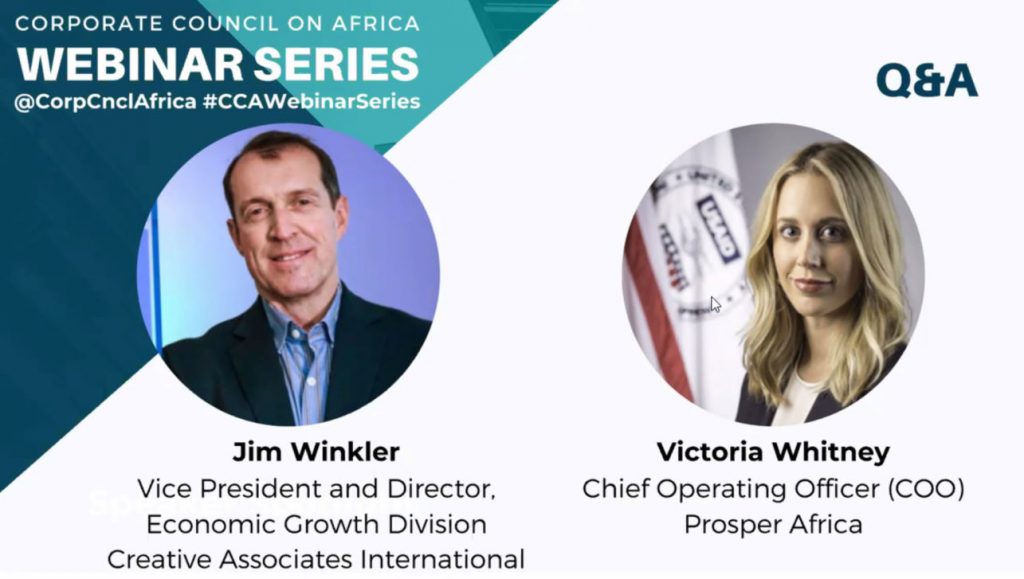The COVID-19 pandemic will change business as usual with regards to trade between the United States and Africa and overall economic development activities on that continent, said the Chief Operating Officer of the U.S. government’s Prosper Africa initiative.
“We’ll need a new level of creativity, connection, and commitment in the coming year amidst this pandemic,” said Victoria Whitney, COO of Prosper Africa, during a May 7 webinar called “Understanding Prosper Africa” hosted by the Corporate Council on Africa.
Amidst the COVID-19 pandemic, understanding Prosper Africa’s alignment with development goals is even more important for practitioners and private sector partners alike, a point made clear during the one-hour Livestream webinar, which was moderated by Creative Associates International’s Vice President of its Economic Growth division, Jim Winkler.
The U.S. administration’s strategy in the region is to bolster commercial relationships and two-way trade between Africa and the United States. Prosper Africa is intended to promote greater economic prosperity in Africa and the United States through targeted investments and job creation.

In addition to Prosper Africa, the U.S. International Development Finance Corporation (DFC) was created as “America’s development bank” and partners with the private sector to finance solutions to the most critical challenges facing the developing world today.
“We want to support African producers to connect to new markets,” Whitney said. “The U.S. government is on the hook to do a better and better job of offering that support.”
Through these two efforts, Whitney told listeners that the United States is “doubling down on its commitment to bringing shared economic prosperity” through trade.
Winkler echoed her comments and said African countries are asking for partnerships, not just aid. One of Prosper Africa’s key efforts is to identify the three most business-friendly policy reforms in each country and then to support governments to put those policies in place and take down barriers to economic growth and business development. The intent is to clear the way for private enterprise to spark growth and leadership development efforts across the continent.
“I believe deeply, as does the administration, that increased two-way trade has tremendous benefits for the continent,” said Whitney. “We’re making it easier than ever for African businesses to access finance, due diligence, services, tools, etc… we want to see more U.S. companies meeting with more African companies face to face. We want to see more U.S. firms traveling to Africa when we return to normal.”
The USAID-funded West Africa Trade and Investment Hub, implemented by Creative, which seeks to unlock over $300 million in private capital for African businesses, is a testament to this renewed commitment to bolstering trade in one of the fastest-growing economies in the world.
FOOD SECURITY AND GLOBAL HEALTH ARE KEY
With the pandemic as the most recent example, USAID and the U.S. government are actively soliciting response plans and aid from businesses, especially in the agricultural sector, with the goal to keep the private sector out front as the world recovers from the initial shock of the pandemic.
Food security was already a major goal for the West Africa Trade and Investment Hub, and it will continue to be prioritized as supply lines were interrupted by nations’ lockdowns.
Through the Trade and Investment Hub, USAID has opened a new fund for West African businesses seeking grants to finance COVID-19 response-related ventures, called “Supporting Sourcing, Agricultural and Non-agricultural Exports and Agricultural Supply Chains affected by COVID-19 in West Africa.” Prosper Africa funding, along with USAID regional and bilateral funding, will provide $200,000 to $500,000 co-investment grants with U.S. and African companies to get people back to work by supporting exports to the U.S. and the region, supporting agriculture to avoid food shortages and starvation and responses to stop the pandemic.
Prosper Africa and the DFC have also stated that women’s economic empowerment, as well as other minority groups, are key considerations in the business ventures they aim to support.
According to remarks made in the webinar, Prosper Africa is expecting to see more activity in the global health supply chains and more companies pivoting to respond to market needs around COVID-19. The DFC has opened a “global health and prosperity fund” to address the pandemic and future health projects.
But beyond immediate response, the pandemic is expected to shift development work toward a greater emphasis on health products and the health industry, and toward greater integration between the health sector and the private sector.
Furthermore, with $25 million of its own funding, Prosper Africa is working to create a “Prosper Africa Roadmap,” a data-driven analysis of business climate challenges and opportunities to help target support.

